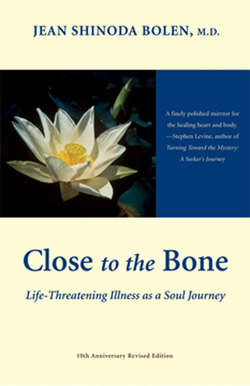Читать книгу Close to the Bone - Jean Shinoda Bolen - Страница 27
На сайте Литреса книга снята с продажи.
Responding to Unchosen Circumstances
ОглавлениеEver since I read Viktor Frankl's book Man's Search for Meaning,3 I have had an appreciation of a spiritual and psychological reality: that no matter how little control we may have over circumstances, even in the most terrible situation, we have a choice of how we will respond. This insight is empowering. Frankl and all of his relatives were taken into Nazi concentration camps, where every one of his family members perished. In this situation, there was no freedom, no choice about what or whether one would eat or work or be sent to the gas chambers the next day. The prisoners were starved and beaten, their legs became swollen with edema. They were stripped of identity, reduced to a number, and denied basic human dignity. And yet, even here, there were choices to be made at a soul level. Some people just gave up, others acted in the same inhuman way as their captors toward weaker inmates, and still others shared what they had, maintained loyalties, and even sacrificed themselves so other prisoners might survive longer. In this apparently meaningless and inhuman existence, Frankl noted that there remained a choice of attitude to take. He emphasized that the search for meaning is essential, and that the will to live depended upon it. If suffering or dying is the task, doing it well or poorly is a choice.
Many years ago, I met with the nursing staff of the Planetree model unit following two deaths that occurred within days of each other. The nurses were in grief and in guilt and needed help with feelings stirred up by these deaths. Both patients were men who had died of AIDS. One of them was someone that the staff had come to know well and love, over years of multiple hospitalizations. They admired his courage as they helped him through his relapses, and with a post-hospital follow-up program, maintained contact with him during remissions. They were emotionally as well as professionally invested in his struggle. His death was mercifully peaceful and a personal loss to most of them. Their reaction to him grew out of his response to his fate: like a man dealt a bad hand but playing it well, he put his energy into living as fully and as long as he could. The other man was characterized as the most disliked patient any of them could remember. Efforts to help him were met with profanity, kindness was ridiculed and thrown back in their faces sarcastically. He was uncooperative, unappreciative, and full of hate. Bitterness, rage, and resentment were his response to having AIDS. He upset and disturbed other patients. He made it difficult to put in IVs or draw blood, and as he wished AIDS on others, contamination by his blood was a frightening possibility. Nurses came to hate him and dreaded the next incident he would provoke. Some found themselves wishing he would die. Their negative feelings were so at odds with their intellectual grasp of why he was behaving this way and their sense of themselves as good people and professionals, that when he died, alone with no one who mourned him, they were filled with guilt and shame. Both men shaped the last part of their lives by how they responded to having a fatal illness and how they treated the people around them. The legacy of feelings that they left behind grew directly out of these choices.
The choice of how we respond to what happens to us usually remains, no matter how difficult the course. When we lose this choice is difficult to determine, because even when there is mental clouding, character seems to remain and influence response. It is not just circumstance that shapes us, either. Adults who have retained the capacity to love and hope and have faith and did not become like the people who abused them in childhood, somehow drew upon an inner wisdom and chose not to do to others what was done to them, or give up on themselves or on people, or succumb to hopelessness or cynicism and self-pity, choices that others in similar circumstances have made that diminish spirit and soul. Variations of these same choices of how we will respond and what we will become as a result, present themselves over and over to all of us in life. If our character and development of soul is shaped by us over time in much the same way as clay is worked upon before it must go through the fire, then we are both the artist and the work itself. We are a work in progress until the final touch. How we respond when we suffer shapes us, and what we do when we know we are dying makes a difference if we truly are spiritual beings on a human path.
